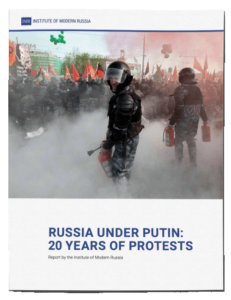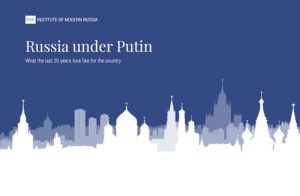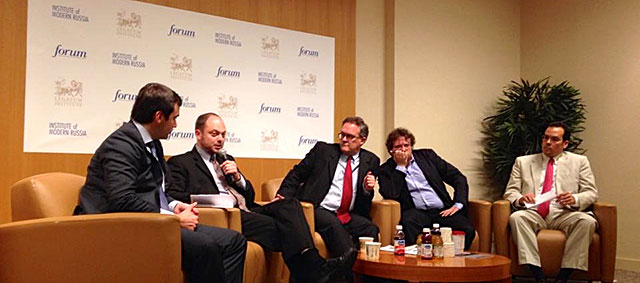Calling for “discipline and responsibility” in the face of the coronavirus, President Vladimir V. Putin of Russia on Wednesday announced the postponement of a referendum next month on whether he can govern until 2036, The New York Times reports (HT:FDD).
An intriguing glimpse into Putin’s mindset is provided in Putin: A Russian Spy Story, a three-part documentary in the form of a character equating to Russia’s James Bond, Suzi Feay writes for The Financial Times (HT: Arkady Ostrovsky, the author of The Invention of Russia: From Gorbachev’s Freedom to Putin’s War):
 Stierlitz, the central role in a moody, monochrome 1973 Soviet TV series, Seventeen Moments of Spring, so impressed Putin at 21 that two years later he joined the KGB. Many years later, the rising political star would re-enact one sequence using music from the soundtrack in a documentary film. “Putin is not an accidental man,” remarks the author Arkady Ostrovsky. Informative interviews with former diplomats, Russia watchers, insiders, writers and journalists add substance and depth to a fairly familiar but well-told tale.
Stierlitz, the central role in a moody, monochrome 1973 Soviet TV series, Seventeen Moments of Spring, so impressed Putin at 21 that two years later he joined the KGB. Many years later, the rising political star would re-enact one sequence using music from the soundtrack in a documentary film. “Putin is not an accidental man,” remarks the author Arkady Ostrovsky. Informative interviews with former diplomats, Russia watchers, insiders, writers and journalists add substance and depth to a fairly familiar but well-told tale.
The Russian president, it’s asserted, still follows the code of the spy: “Nothing is forgotten and nothing is forgiven.”
The first testimonial about Putin’s character comes from the opposition politician Vladimir Kara-Murza, who has had the misfortune of being poisoned by people he is certain are connected to Putin and his state security apparatus not once, but twice, nearly dying both times, The Guardian adds.
“I have no doubt absolutely that this was done as retribution for my political activities in the Russian opposition,” he says. Kara-Murza – below – at a National Endowment for Democracy (NED) forum – sees Putin as a product of his background, specifically of his KGB training: “He’s doing what he was taught to do – manipulate, lie, recruit, repress. He seems to be quite good at his job.”
75 percent of Russians regard the Soviet era as the greatest period in Russian history, according to a new Levada Center poll, Svoboda reports (HT: Adrian Karatnycky).
 The Institute of Modern Russia is launching a new project, “Russia under Putin,” to mark the 20th anniversary of Vladimir Putin’s first election as president.
The Institute of Modern Russia is launching a new project, “Russia under Putin,” to mark the 20th anniversary of Vladimir Putin’s first election as president.
Most national and western media have adopted an approach to covering Russia that is focused on Putin, which is not surprising under such a personality-based regime, IMR observes:
- However, as a result, developments within civil society—no less crucial than Kremlin intrigues—are often excluded from the agenda;
- Another problem is the short-term perspective of such coverage and analysis, which often obscures (or altogether leaves out) long-term causes and effects;
- Finally, the Kremlin’s propaganda machine is quite adept at manipulating narratives, emotions, and opinions of target audiences, distracting them from the facts and distorting the agenda even further.
The first report (“Russia under Putin: 20 years of protests“) focuses on the protest movement, adds IMR, whose goal is to unearth the roots of current political developments and bring clarity to Russia’s future trajectories.








